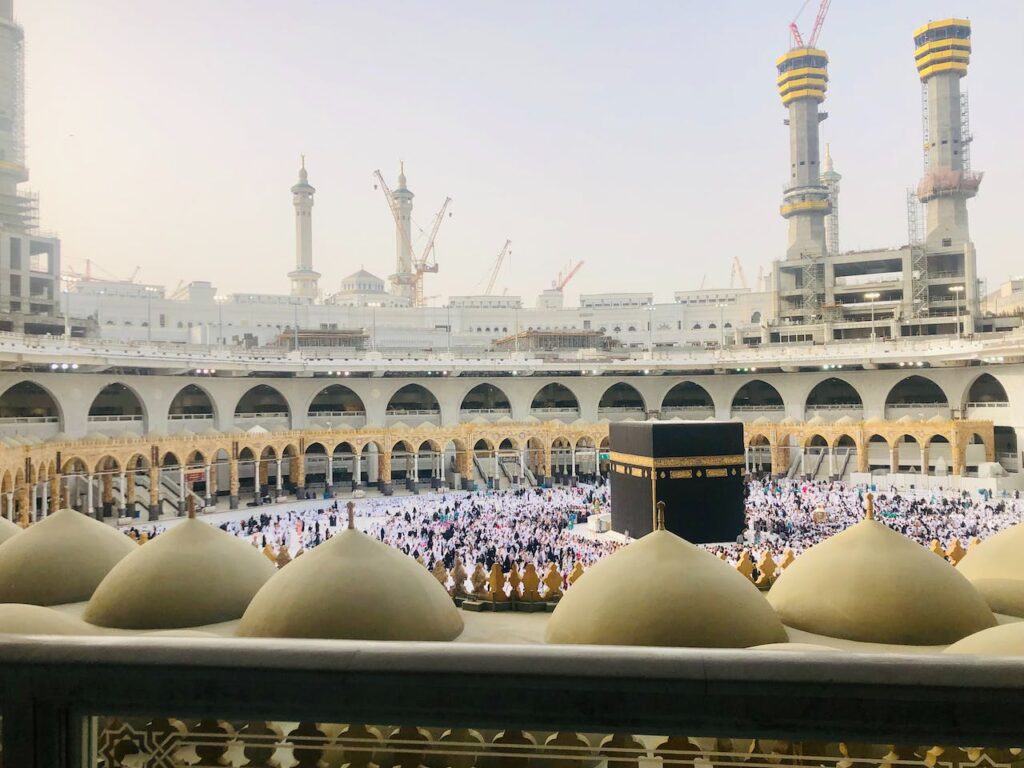The Umrah, an Islamic pilgrimage, holds great significance for millions of Muslims around the world. It is a voluntary act of worship involving a series of rituals performed in the holy city of Mecca, Saudi Arabia. This article aims to provide a comprehensive understanding of Umrah in Arabic, its rituals, and the essential prohibitions associated with this sacred journey.
Rituals of Umrah in Arabic | مناسك العمرة
Firstly, Ihram (الإحرام):
The journey begins with entering the state of Ihram, a sacred state of purity. Pilgrims dress in simple white garments, symbolizing equality and unity in the eyes of Allah. Men wear two unstitched white sheets, while women dress modestly, adhering to the guidelines of Islamic attire.
Secondly, Circumambulate – Tawaf (الطواف):
The next significant ritual is Tawaf, where pilgrims circumambulate the Kaaba, the sacred house of Allah, 7 times in a counterclockwise direction. Muslims express their devotion and submission to Allah during this act, reflecting the unity of the Muslim Ummah.
Thirdly, Sa’i (السعي)
Following Tawaf, pilgrims proceed to perform Sa’i. This involves walking briskly 7 times between the hills of Safa and Marwa, commemorating the search for water by Hajar, the wife of Prophet Ibrahim (pbuh), for her son Ismail (pbuh). Sa’i symbolizes perseverance, trust in Allah, and the recognition of Hajar’s faith.
Lastly, Shaving or Trimming (الحلق أو التقصير):
After completing Sa’i, men have the option to have their heads shaved (Halq) or their hair trimmed (Taqsir). Women trim a small portion of their hair as a sign of completion of the Umrah rituals. This act signifies humility and detachment from worldly attachments.
Prohibitions of Umrah (المحظورات)
Firstly, Cutting Hair and Nails (قص الشعر أو الأظافر)
Pilgrims in the state of Ihram are prohibited from cutting their hair or nails until they complete the Umrah rituals. This restriction reflects the state of consecration and the focus on spiritual devotion during the pilgrimage.
Secondly, Intimacy and Marital Relations (العلاقة الزوجية والحميمية)
During the state of Ihram, pilgrims are prohibited from engaging in any form of intimacy or marital relations. This restriction aims to maintain the sanctity and purity of the pilgrimage experience.
Thirdly, Hunting and Killing (الصيد والقتل)
Pilgrims are strictly prohibited from hunting or killing any living creature within the boundaries of the Haram (sacred precincts). This prohibition emphasizes the preservation of life and the sanctity of the holy sanctuary.
Additionally, Using Fragrances and Cosmetics (العطور والطَيب)
Pilgrims in the state of Ihram should refrain from using perfumes, scented oils, or any products with a fragrance. This prohibition serves as a reminder to focus on the spiritual aspect of the pilgrimage rather than worldly adornments.
Duas for Umrah in Arabic
Here’s a dua (supplication) for Umrah in Arabic and its English translation:
اللَّهُمَّ إِنِّي أُرِيدُ الْعُمْرَةَ، فَيَسِّرْهَا لِي وَتَقَبَّلْهَا مِنِّي
“O Allah, I intend to perform Umrah, so make it easy for me and accept it from me.”
اللَّهُمَّ اجْعَلْنِي مِنَ التَّوَّابِينَ وَاجْعَلْنِي مِنَ الْمُتَطَهِّرِينَ
“O Allah, make me among those who repent and purify themselves.”
اللَّهُمَّ إِنِّي أَسْأَلُكَ عِلْمًا نَافِعًا وَرِزْقًا طَيِّبًا وَعَمَلاً مُتَقَبَّلاً
“O Allah, I ask You for beneficial knowledge, good provision, and accepted deeds.”
اللَّهُمَّ إِنِّي أَسْأَلُكَ تَمَامَ الصِّحَّةِ وَالْعَافِيَةِ فِي الدِّينِ وَالدُّنْيَا وَالْآخِرَةِ
“O Allah, I ask You for complete health and well-being in this life and the Hereafter.”
اللَّهُمَّ اغْفِرْ لِي وَارْحَمْنِي وَتُبْ عَلَيَّ إِنَّكَ أَنْتَ التَّوَّابُ الرَّحِيمُ
“O Allah, forgive me, have mercy on me, and accept my repentance. Surely, You are the Accepter of repentance, the Merciful.”
اللَّهُمَّ زِدْنِي هُدًى وَبَصَرًا وَقُوَّةً وَرِزْقًا وَعَافِيَةً
“O Allah, increase me in guidance, insight, strength, provision, and well-being.”
Conclusion
In conclusion, Umrah is a deeply spiritual journey that allows Muslims to connect with their faith, seek forgiveness, and strengthen their relationship with Allah. The rituals of Umrah, including Ihram, Tawaf, Sa’i, and Halq/Taqsir, are performed with utmost devotion and humility. Understanding the prohibitions associated with Umrah is essential to ensure a fulfilling and spiritually rewarding experience. By adhering to these prohibitions, pilgrims can fully immerse themselves in the sacred atmosphere and reap the blessings of this extraordinary pilgrimage.






